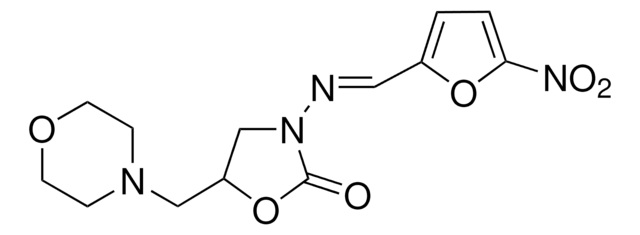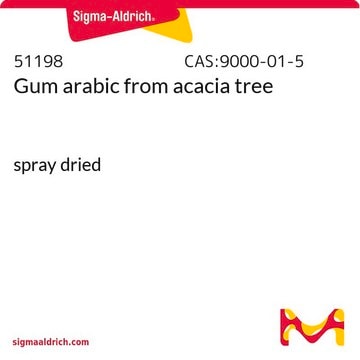G1128
Tragacanth
Sinónimos:
Gum tragacanth
Iniciar sesiónpara Ver la Fijación de precios por contrato y de la organización
About This Item
Productos recomendados
biological source
plant (Astragalus gummifer)
Quality Level
form
powder
color
beige
solubility
H2O: 20 mg/mL
storage temp.
room temp
¿Está buscando productos similares? Visita Guía de comparación de productos
General description
Tragacanth is a gum commonly found in the sap of various Middle Eastern legumes. It is commonly used as freezing-embedding medium for tissue preservation.
Application
When mixed with water, tragacanth yields a colloidal hydrosol. The bassorin fraction (which consists of approx. 60-70% of the compound) swells to form a gel. This swelling gives the gum tragacanth the ability to form thick, viscous dispersions and pastes. It is an effictive emulsion stabilizer.
Other Notes
A complex mixture of polysaccharides including tragacanthin and bassorin.
To gain a comprehensive understanding of our extensive range of Polysaccharides for your research, we encourage you to visit our Carbohydrates Category page.
Storage Class
11 - Combustible Solids
wgk_germany
WGK 2
flash_point_f
Not applicable
flash_point_c
Not applicable
ppe
Eyeshields, Gloves, type N95 (US)
Certificados de análisis (COA)
Busque Certificados de análisis (COA) introduciendo el número de lote del producto. Los números de lote se encuentran en la etiqueta del producto después de las palabras «Lot» o «Batch»
¿Ya tiene este producto?
Encuentre la documentación para los productos que ha comprado recientemente en la Biblioteca de documentos.
Los clientes también vieron
Setareh Ghorban Shiroodi et al.
The Journal of dairy research, 79(1), 93-101 (2012-11-23)
In this study, the physicochemical properties of a low-fat dried yogurt paste (kashk) were determined, and the effects of different concentrations (0, 0·1, 0·3 and 0·5% w/w) of gum tragacanth exudates from Astragalus gossypinus on the stability and texture of
C A Edwards et al.
The British journal of nutrition, 73(5), 773-781 (1995-05-01)
The exact mechanisms by which non-starch polysaccharides increase stool output are unknown. In the present study the hypothesis that the site of fermentation and short-chain fatty acid (SCFA) accumulation is related to the action of non-starch polysaccharides (NSP) on stool
D M Anderson
Food additives and contaminants, 6(1), 1-12 (1989-01-01)
Gum tragacanth (GT), affirmed as GRAS within the USA since 1961, was evaluated as 'ADI not specified' by JECFA in 1985. Within the EEC, GT has been permitted temporarily as a food additive (E413), without an ADI, since 1974; a
R Koppang et al.
The Journal of prosthetic dentistry, 73(5), 486-491 (1995-05-01)
An in vitro test is described that simulates the in vivo fate of a denture adhesive, namely destruction, dilution, and dissolution of the adhesive, by repeated measurement of tensile bond strength for the adhesive in isotonic saline over time. The
S Aziznia et al.
Journal of dairy science, 91(7), 2545-2552 (2008-06-21)
The effect of whey protein concentrate (WPC) and gum tragacanth (GT) as fat replacers on the chemical, physical, and microstructural properties of nonfat yogurt was investigated. The WPC (7.5, 15, and 20 g/L) and GT (0.25, 0.5, 0.75, and 1
Nuestro equipo de científicos tiene experiencia en todas las áreas de investigación: Ciencias de la vida, Ciencia de los materiales, Síntesis química, Cromatografía, Analítica y muchas otras.
Póngase en contacto con el Servicio técnico











